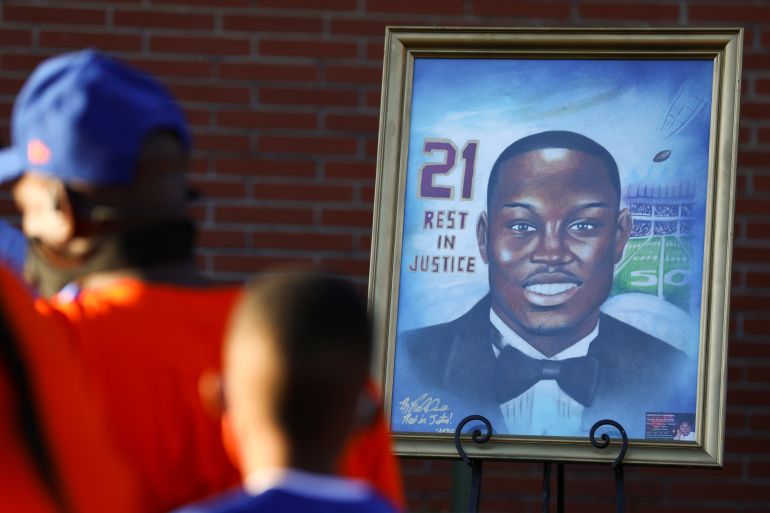US judge sentences Ahmaud Arbery’s killers to life in prison
Travis and Gregory McMichael and their neighbour William Bryan were convicted in November of killing Arbery.

A judge in the United States has sentenced three men to life in prison for the killing of Ahmaud Arbery, whose fatal 2020 shooting in the state of Georgia fuelled mass protests against racism and vigilantism.
Georgia Judge Timothy Walmsley ruled on Friday that Travis McMichael, 35, and his father, 66-year-old Gregory McMichael, would spend life in prison without the possibility of parole.
Keep reading
list of 3 itemsThree men were convicted for Ahmaud Arbery’s murder. What next?
Ahmaud Arbery killing: US lawyers deliver closing arguments
Walmsley also sentenced the McMichaels’s neighbour, William “Roddie” Bryan, to life in prison, but he will have the possibility of parole after 30 years – the minimum sentence allowed for murder under state law.
A Georgia jury in November found the three men – who chased and fatally shot Arbery in February 2020 as he jogged through the coastal community of Satilla Shores – guilty of a range of charges, including felony murder.
Walmsley said at the hearing in Glynn County Court in Brunswick on Friday that he gave the McMichaels the harshest sentence open to him in part because of their “callous” words and actions captured on video.
“It was a chilling, truly disturbing scene,” the judge said of the frame in a cellphone video of the killing where Travis McMichael begins to lift his shotgun at Arbery while the 25-year-old is about 20 feet away.
He said Arbery was “hunted down and shot and he was killed because individuals here in this courtroom took the law into their own hands”.
‘Full of life’
During the sentencing hearing earlier on Friday, Arbery’s relatives had asked the judge to show no lenience to the three men. Defence lawyers had pleaded for leniency, saying none of the three men ever intended for Arbery to be killed.
Arbery’s sister, Jasmine Arbery, recalled her brother’s humour, describing him as a positive thinker with a big personality. She told the judge her brother had dark skin “that glistened in the sunlight”, thick, curly hair and an athletic build, factors that made him a target to the men who pursued him.
“These are the qualities that made these men assume that Ahmaud was a dangerous criminal and chase them with guns drawn. To me, those qualities reflect a young man full of life and energy who looked like me and the people I loved,” Jasmine Arbery said.
Ben Crump, a civil rights attorney representing the Arbery family, welcomed the sentences on Friday, saying the convicted trio “stalked, cornered and lynched” Ahmaud Arbery in broad daylight. He called the outcome of the trial a sign of progress in the fight for racial justice.
“But we are not done. The tragic murder of Ahmaud Arbery must not be in vain,” Crump said in a statement. “America, we are showing progress. Now is not the time to retreat. We must continue to demand better from law enforcement, from our justice system and from society as a whole.”
The family of #AhmaudArbery spoke in court before their son's murderers were sentenced to life in prison.
"They have no remorse and do not deserve any leniency," said Arbery's mother. pic.twitter.com/5GZWx9iJbB
— AJ+ (@ajplus) January 7, 2022
Appeal expected
Arbery was running through Satilla Shores, Georgia, on the afternoon of February 23, 2020, when the McMichaels decided to grab their guns, jump in a pickup truck and give chase through the predominantly white community.
A graphic video of Arbery’s killing leaked two months later, driving mass public protests against anti-Black racism and vigilantism, as well as calls for accountability. It also prompted Georgia state officials to take over the case and ultimately charge the trio.
“They chose to target my son because they didn’t want him in their community,” Wanda Cooper-Jones, Arbery’s mother, told the court on Friday. “When they couldn’t sufficiently scare him or intimidate him, they killed him.”
Al Jazeera’s Shihab Rattansi, reporting from Washington, DC, said it is important to remember that charges were only filed against the three men when the video footage of Arbery’s killing was leaked.
“In the immediate aftermath of Arbery’s death, the local police, the local prosecutors, all believed these three white men – now convicted of murder – [who said] that Arbery was up to no good,” Rattansi said. “It reveals so much about race relations in Georgia and in America as a whole.”

The men’s defence lawyers have said they will appeal the convictions. Bob Rubin, a lawyer for the younger McMichael, said life without parole should be reserved only for “the worst of the worst”.
“His goal was not to commit a crime that day or kill somebody that day,” Rubin said of Travis McMichael. “His goal was to have a family afternoon.”
None of the three convicted men used their right to address the court at the hearing.
The trio also faces a federal trial in February on separate hate-crime charges, accused in an indictment of violating Arbery’s civil rights by attacking him because of his “race and color”. They have pleaded not guilty to those charges.